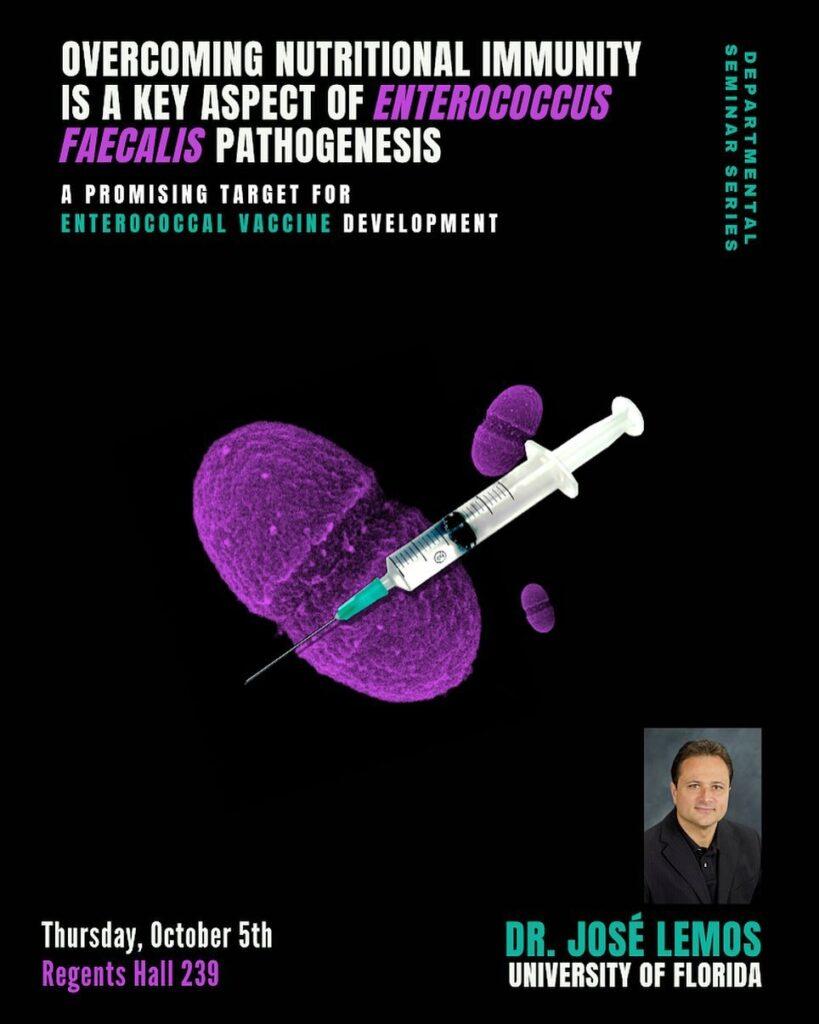The department of biology hosted a University of Florida professor at an Oct. 5 seminar, where he discussed nutritional immunity as a method to combat bacterial infections.
José Lemos, associate professor in the department of oral biology at the University of Florida, presented his research on developing a vaccine for Enterococcus faecalis, a gut-living bacteria that can cause numerous infections. The vaccine would prevent bacteria from being able to intake metals that are key for their reproduction.
“Enterococcus faecalis is a relevant bacteria that can cause numerous problems in the GI tract and cause infections, like meningitis,” said Lemos during the presentation.
The biology department seminar series has been an ongoing program since 2014 and provides a forum for biology scholars around the country to present their research. Each talk is hosted by a Georgetown biology department faculty member.
Shaun Brinsmade, professor of biology at Georgetown and host of the seminar, said that traditional methods of combating these bacterial infections are outdated.
“We’ve been basking in the glory of antibiotics since the 1940s since they were made available. The ones that we have are becoming ineffective because of antibiotic resistance,” Brinsmade told The Hoya. “If one bug knows how to be resistant to an antibiotic, it can teach the other bug effectively how to do that.”
According to Lemos, the trace metals iron, zinc and manganese are beneficial for our bodies in small amounts but give bacteria the power to multiply if they gain access to them.
“The host having the ability to withhold these essential biometals from the bacteria is a mechanism of host defense against bacterial infections,” Lemos told The Hoya. “They need energy sources. Bacteria are a living organism and they need a lot of the things that we need.”
Lemos explained that nutritional immunity is the body’s method of interrupting a bacteria’s ability to take in trace metals. Lemos’s experimentation involved deleting the genes from the Enterococcus bacteria that enabled them to take certain metals from the host, and the results were fatal for the bacteria.
“We also knew that the host takes advantage of that essentiality to sequester these metals from bacteria. It’s a nutritional immunity mechanism when they perceive a pathogen,” Lemos said. “If we knock out the genes that encode the proteins that mediate the metal uptake of manganese, zinc and iron, that will be very detrimental to the pathogen.”

Marcelle Ferreira, a graduate student at Georgetown doing research in Brinsmade’s lab on Staphylococcus aureus, a similar bacteria to Enterococcus faecalis, expressed concerns with the vaccine development. Some of these bacteria exist as harmless commensals, and they assist with gut health, Ferreira said.
“In terms of specificity, you cannot only kill the bacteria that is causing the disease, you are also going to kill bacteria that are good for your health,” Ferreira said to The Hoya. “It’s very hard to target only the pathogenic bacteria because the commensals can also become pathogens.”
According to Ferreira, the new method of denying Enterococcus faecalis access to metals is a multifaceted solution that requires dealing with the herd resistance of bacteria to antibiotics by preventing them from multiplying in the first place.
“Antibiotic resistance has to be accessible for everybody,” Ferreira said. “If you control virulence, you can also assess the drug resistance problem as well. The other thing is the vaccine.”
Brinsmade believes Lemos is doing formative work for the future of fighting bacterial infections.
“We’re finding new ways to fight these infections. One way is to find new drugs. Another way is to prevent infections from occurring in the first place, by creating vaccines,” Brinsmade said. “I think that the big significance of his work is finding alternative ways to fight these infections.”









Francesca • Oct 13, 2023 at 10:34 am
Shiva! This is so interesting, great work!
michael • Oct 12, 2023 at 11:51 pm
slayyyyy shiva
Maggie Yang • Oct 12, 2023 at 9:59 pm
shiva!!